

EdTech Focus on K-12: IT and Education. K-12 Education Tips & Strategies That Work. WeAreTeachers - Get Lesson Plans - Teacher Grants - Teaching Resources and More. 8 Examples of Transforming Lessons Through the SAMR Cycle. The SAMR Model for integrating technology into teaching, developed by Dr.
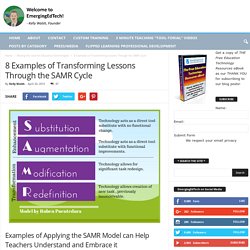
Think. Learn. Innovate. TwitDoc.com - the EASY way to share your documents on Twitter. Edudemic. Elearning Software. Free Technology for Teachers. The Innovative Educator. How we will learn. MindShift explores the future of learning in all its dimensions.
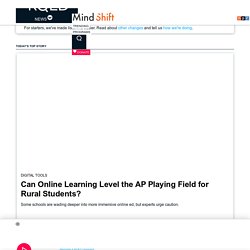
We examine how learning is being impacted by technology, discoveries about how the brain works, poverty and inequities, social and emotional practices, assessments, digital games, design thinking and music, among many other topics. We look at how learning is evolving in the classroom and beyond.We also revisit old ideas that have come full circle in the era of the over scheduled child, such as unschooling, tinkering, playing in the woods, mindfulness, inquiry-based learning and student motivation. We report on shifts in how educators practice their craft as they apply innovative ideas to help students learn, while meeting the rigorous demands of their standards and curriculum. Search Results Nine steps to quality online learning. Teacher Tipster Home. 101 Innovations in Scholarly Communication: How researchers are getting to grip with the myriad of new tools.
There has been a surge of new scholarly communication tools in recent years.
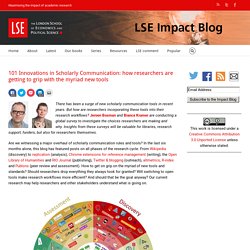
But how are researchers incorporating these tools into their research workflows? Jeroen Bosman and Bianca Kramer are conducting a global survey to investigate the choices researchers are making and why. Insights from these surveys will be valuable for libraries, research support, funders, but also for researchers themselves. Are we witnessing a major overhaul of scholarly communication rules and tools? In the last six months alone, this blog has featured posts on all phases of the research cycle. Avalanche of tools Almost half of the tools in our database of scholarly communication tools were created since 2013. Simple model We use a simple model to get a grip on this abundance and variety of tools. Global survey. Anybody can learn. Visualization tools. FORUM: Improving education involves everyone. NOVEMBER was parent-teacher conference season.
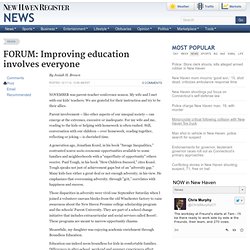
My wife and I met with our kids' teachers. We are grateful for their instruction and try to be their allies. Parent involvement -- like other aspects of our unequal society -- can emerge at the extremes, excessive or inadequate. For my wife and me, reading to the kids or helping with homework is often rushed. Still, conversation with our children -- over homework, reading together, reflecting or joking -- is cherished time. A generation ago, Jonathan Kozol, in his book "Savage Inequalities," contrasted scarce socio-economic opportunities available to some families and neighborhoods with a "superfluity of opportunity" others receive.
Those disparities in adversity were vivid one September Saturday when I joined a volunteer canvass blocks from the old Winchester factory to raise awareness about the New Haven Promise college scholarship program and the schools' Parent University. Parental engagement happens in different ways. The Best K-12 Education Technology Blogs. If it takes a village to raise a child, how many people does it take to train an educator?
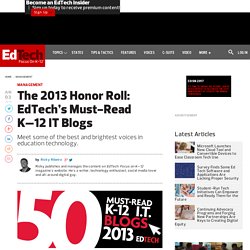
It’s hard to say, but 50 helping hands seems like a good place to start. In the spirit of community, collaboration and information sharing, EdTech: Focus on K–12 has rounded up 50 ed-tech blogs that we deem must-reads for the K–12 community. © 2010-2015 EdTech Digest. EdTechTeacher Blog. Cool Cat Teacher Blog. Educational Leadership:How Teachers Learn:Learning with Blogs and Wikis. Top 25 Elementary School Teacher Blogs of 2012. Technology, leadership, and the future of schools.
Emergent Learner. Education Rethink @edrethink. Using design to hook my students into their project. Practical Ed Tech Presentations and Workshops. DigiAcademy-Fixing illiteracy via eCROP's digital palette solutions. Ed technology. K12 educational transformation through technology. MiddleWeb: All About the Middle Grades. Rethinking Schools. Following Twitter chats - 3 easy ways. Twitter for Teachers. Find this page at: DitchThatTextbook.com/twitter Set up your Twitter account by going to: twitter.com.
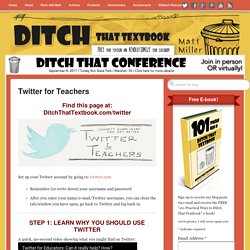
Edu Tech Stories. The Top 20 Education Blogs. Technorati ranks more than 100,000 blogs with “authority” calculations “based on a site’s linking behavior, categorization and other associated data over a short, finite period of time.”
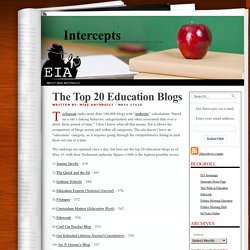
I don’t know what all that means, but it allows for comparison of blogs across and within all categories. The site doesn’t have an “education” category, so it requires going through the comprehensive listing to pick them out one at a time. The rankings are updated once a day, but here are the top 20 education blogs as of May 16, with their Technorati authority figures (1000 is the highest possible score): The Teacher's Guide To Wikipedia In The Classroom. This guide, in the form of 11 questions and answers, helps clarify certain misconceptions about what has come to be one of the most popular and frequently used websites in the world.
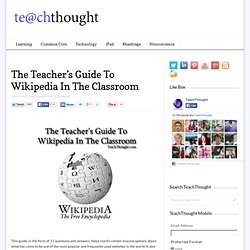
It also can can be found in its entirety on wikipedia.com. As it is created by Wikipedia–or some arrangement of its volunteer editors–it is undoubtedly biased, but equally informative. Background Concepts such as open source, copyleft, collaborative writing, and volunteer contributions for the public good can be new and unfamiliar ideas to many students. Wikipedia offers an opportunity for educators to explore concepts of public trust that are likely to continue growing in prominence throughout the lives of today’s population of youth. My Paperless Classroom. Transforming schools and classrooms into learning communities with personalized technology tools and digital content.
K12 educational transformation through technology. The Daring Librarian.